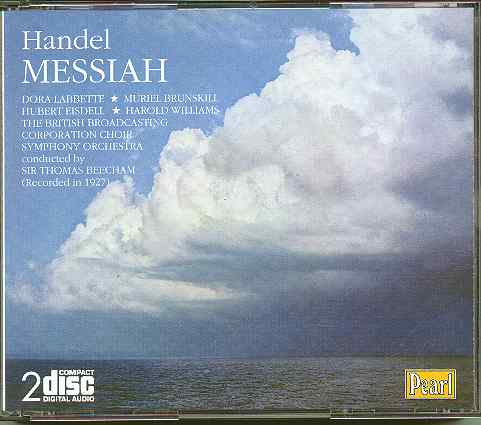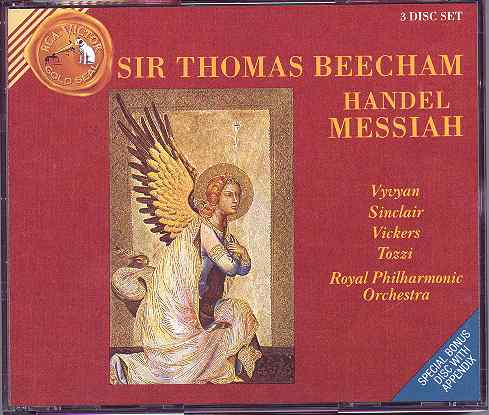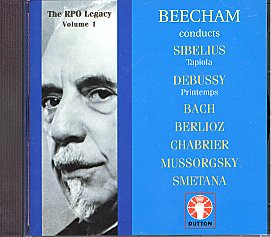![[Photo of Beecham]](beecham.jpg)

 >
>
 >
>


Music of Richard Strauss took pride of place with not one, but two discs featuring identical contents: the Oct.-Dec. 1947 Ein Heldenleben, with contemporary recordings of the Love Scene from Feuersnot, an Interlude from Intermezzo and the Dance of the Seven Veils from Salome. BIDDULPH WHL 056 was quickly followed by TESTAMENT SBT 1147 disc, and equally quickly attacked in British courts, where Testament was granted an order restraining sale of the Biddulph disc, giving Testament exclusive rights to sell this program in the U.K. North American record buyers have the choice of either; reviews found both sets' transfers to be praiseworthy (the Testament issue being slightly quieter due to their use of CEDAR processing) so sage advice is "buy whichever comes your way, but buy one or the other of these classic performances." A second R. Strauss disc of note was PREISER 90341, titled "Sir Thomas Beecham dirigient Richard Strauss," which contains excerpts from Ariadne auf Naxos and Elektra
 DUTTON began The RPO Legacy series in 1998 with a disc
devoted to music of Berlioz, Sibelius (Tapiola), Mussorgsky,
Debussy, J.S. Bach, Smetana and Chabrier (CDLX 7027). Volume 2
(CDLX 7028) brought to CD for the first time a number of shorter
Delius pieces (including the 1946 Brigg Fair, certainly one of
Sir Thomas' finest recordings). Now Volume 3 (CDLX 7033) has
arrived, with the studio recording of the Sibelius 2nd
(1946/7) and 6th(1947) symphonies. The former is not the
well-known 1954 concert recording EMI circulates from time to time
(and which is currently out of print.)
DUTTON began The RPO Legacy series in 1998 with a disc
devoted to music of Berlioz, Sibelius (Tapiola), Mussorgsky,
Debussy, J.S. Bach, Smetana and Chabrier (CDLX 7027). Volume 2
(CDLX 7028) brought to CD for the first time a number of shorter
Delius pieces (including the 1946 Brigg Fair, certainly one of
Sir Thomas' finest recordings). Now Volume 3 (CDLX 7033) has
arrived, with the studio recording of the Sibelius 2nd
(1946/7) and 6th(1947) symphonies. The former is not the
well-known 1954 concert recording EMI circulates from time to time
(and which is currently out of print.)
Another 1998 Dutton issue featured Beecham's 1928 recordings of the Atterberg Symphony No. 6 and Mozart Symphony No. 34. with shorter works by Mozart, Delius and Grieg (DUTTON CDLX 7026.) A couple of people have commented adversely on heavy use of CEDAR processing in this disc, but some will more readily accept historic recordings when they have a quiet background. Whatever your tastes in remastering techniques might be, this is the only way the music can be heard, and it should be.
No Beecham report would be complete without an opera entry. The long-available first recording (1929) of Gounod's Faust (DUTTON 2CDAX 2001, pictured below) has now been joined by the CD premiere of the 1947/8 French-language version on PREISER 90355. The set, although rather hard to locate in North America, has been reviewed in Germany and should be available soon.


The joy of Beecham's 1947 Messiah (BIDDULPH WHL 059/61) continues to be a cause for rejoicing as, for the first time in history all three Beecham recordings of this work are available at the same time (although PEARL GEMM 9456 may have to be special-ordered from your dealer). As with the of Faust recordings, early and late, collectors at the end of this century are offered an opportunity to compare and savor first-class transfers of recordings that have, in other decades, brought premium prices for LPs that were not always in the best of shape.
The best news of all is saved for last. The BBC has formed a new label to circulate reissues from their immense broadcast archive. Among titles now available in the U.K. are the Berlioz Requiem (BBC LEGENDS BBCL4011-2) and the concert of 8 Nov 1959, including Mendelssohn's Fair Melusine Overture and the Beethoven Symphony No. 7 (BBC LEGENDS BBCL4012-2). U.S. collectors are denied these at present, as the first group of 10 imported by Koch International did not include these titles. Check with your record dealer for an arrival date.
The items above will be included in a Spring-1999 revision of the
Beecham compact disc lists, which has been delayed until a clear
picture emerges of which Beecham CDs have been deleted by record
companies made nervous by unsettled economic conditions. Deletions
are the bane of a record collector's life, but happen anyway. If you
share my love of the legacy left by Sir Thomas Beecham, you owe it to
yourself to consider gaps in your personal collection and buy what you
need now, because it could be gone tomorrow. Whatever you do, take
joy in how Beecham made music for all of us.